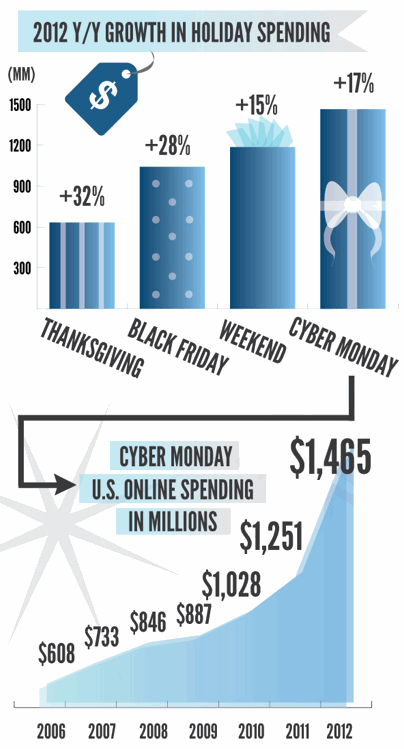The turkey is finished and all the relatives have gone home. We are all familiar with Black Friday retail shopping and the ridiculous hours stores are open on the Friday after Thanksgiving, but in recent years another shopping holiday has been created — Cyber Monday. The term was coined within the ecommerce community during the 2005 holiday season, when data showed that the Monday following Thanksgiving was one of the biggest online shopping days of the year. Thus the term "Cyber Monday" was born and online retailers offer discounts and promotions to persuade people to shop online.
Since 2005, comScore has been recording spending data on cyber Monday and keeping track to see the growth that has come from the relatively new online holiday. See this chart they made using the 2012 shopping data.

So far, comScore has only reported the 2013 Black Friday online purchase totals, but if these are any indication of what we can expect to see after today, I think the Cyber Monday numbers are going to be very high. Here is the latest report on 2013 sales:
Black Friday 2013 (November 29) saw $1.198 billion in desktop online sales, making it the season’s first billion dollar day and heaviest online spending day to date, while representing a 15-percent increase versus Black Friday 2012. Thanksgiving Day (November 28), while traditionally a lighter day for online holiday spending, achieved a strong 21-percent increase over Thanksgiving Day last year to $766 million….
66.1 million Americans visited online retail sites on Black Friday using a desktop computer, representing an increase of 16 percent versus year ago. Amazon once again ranked as the most visited online retail site on Black Friday, followed by eBay, Walmart, Best Buy and Target. For the holiday season-to-date, Apparel & Accessories ranks as the leading product category for the season-to-date, accounting for 28 percent of online spending. Computer Hardware ranks #2 at 19 percent, followed by Consumer Electronics (7 percent), Consumer Packaged Goods (5 percent) and Shipping Services (5 percent).
With more and more people shopping online, the question of sales tax and whether you pay it on internet purchases arises. The determining factor is whether the seller has a physical presence, which includes property or employees, in North Carolina or your state of residence. This comes from a Supreme Court decision in 1977 that changed the original rule disallowing state taxation on interstate commerce to a new rule stating that "states could impose non-discriminatory, fairly apportioned, service-related taxes on businesses with substantial presence (nexus) in the state." To gain more background information on the sales tax situation, check out this Tax Foundation Blog on online sales taxes. North Carolina is unfortunately not the lowest sales tax state in the region, ranked 35th highest in the nation at 4.75%.
The good news from this is that increased sales during the holiday season let investors and firms know there is money being spent. Thus, these numbers may indicate that the lagging recovery from the Great Recession is now over, and we can see some more confidence in our economy and markets than in past holiday seasons. Only time will tell, but from the Black Friday numbers it seems we are doing well, and Christmas is still 3 1/2 weeks away.
Click here for the Fiscal Update archive.

